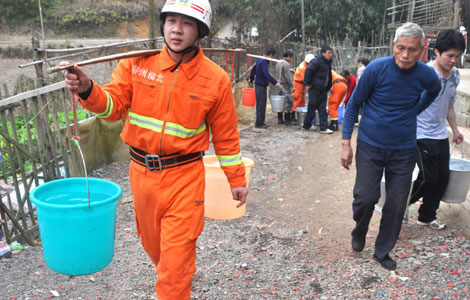Workers follow manufacturers moving inland
Updated: 2012-01-31 22:11
(Xinhua)
|
|||||||||
ZHENGZHOU - As some manufacturers pull out of China's increasingly costly coastal regions and move to the hinterlands, many workers in traditional manufacturing hubs have decided to stay in their home provinces -- a decision that is sparking a real movement of laborers inland.
Outside Foxconn's factory in suburban Zhengzhou, capital of Central Henan province, dozens of recruitment stands are nestled, bazaar-like, in prefabricated huts crammed along both sides of the road and loudspeakers repeat job advertisements over and over.
In and out of those shacks, migrant workers wheel suitcases or tug nylon bags bursting with clothes and quilts, inquiring about jobs, filling out forms or lining up for interviews.
Meanwhile, packed buses from the central bus station or the train station usher more workers to the recruitment fair.
After being shaken by a series of suicides in the costal factory hub of Shenzhen about two years ago, Foxconn, the world's largest contract electronics manufacturer, responded by raising wages twice in its Shenzhen plant, which used to house 450,000 workers, and stepping up its drive to transfer a large portion of production to interior provinces, such as Henan and Sichuan.
Like other firms that have relocated their labor-intensive sectors to the less costly central and western provinces, Foxconn's move to the interior is a natural result of cost control consideration.
The minimum wage in Shenzhen has reached 1,500 yuan ($237.5) per month, but the base monthly salary in Henan stands at 1,080 yuan despite an over-30-percent hike last year. Other production costs are also lower in Henan and other inland provinces.
Moreover, Foxconn seems to have learned from what prompted the suicides, including young laborers' loneliness due to working far from home. The new locations near the homes of millions of migrant workers can now tap into the strong family values of rural Chinese.
Liu Chunlei, 25, from Zhumadian, Henan province, came here with his wife. He used to drive vans in the adjacent Hebei province, and his wife worked in a toothbrush factory in East China's Jiangsu province.
"I want to work here (Foxconn) because it's near my home. It's much easier for me to go back and see my two toddlers," Liu said as he waited for an interview and medical examination.
For similar reasons, Zheng Yazhou, 22, came here from Xinmi, a city outside of Zhengzhou. After graduating from a vocational school four years ago, he went to factories in southern China's Guangdong province and later moved to Jiangsu to work as a billboard installer.
"My dad was injured in a car accident last December. I need to find a job near home so I can take care of him," said Zheng, whose hometown is one hour away by bus.
Migrant workers prefer to find jobs close to home, as long as the salary can make ends meet. They can better look after their families, and even if the salary is a bit lower, so are expenses, said Gu Jianquan, deputy dean of the Henan Academy of Social Sciences.
A number of people from Zheng's village have been working in Foxconn's Zhengzhou plant, and he said that they told him the salary there was OK.
The base salary during the three-month trial period is 1,350 yuan, and the overall monthly income after the trial period will exceed 2,500 yuan, according to the poster at a recruitment stand.
"The average wage is about 700 yuan less than in the Shenzhen plant," said Li Chensheng, 18, who worked there for a year before transferring to Zhengzhou. "But things are too expensive in Shenzhen, so the money leftover is almost the same."
Li was more than happy to return to his home province.
"That was the first time I'd been away from home. I missed my family," Li said, adding that the workers from Henan that he knew in the Shenzhen factory had all returned home.
By the end of January, Foxconn's Zhengzhou plant, which started production in August, employed 130,000 workers, 123,000 of whom were locals.
Nevertheless, the company is continuing to hire aggressively, with the head count expected to double by the end of this year.
The relocations of major manufacturers, such as Foxconn and the Pou Chen Group, which churns out the lion's share of the world's top athletic shoes, meant that as many as 12.68 million of Henan's migrant workers took jobs within the province in 2011, the first time that more workers stayed in Henan than left to work elsewhere, according to statistics from the provincial human resources authority.
A year earlier, Sichuan province, another labor-rich inland province, also staged a tipping point as migrant workers flowing out of the province reported zero growth from 2009.
The movement of laborers inland will be a trend over the next few years in China as economic restructuring presses ahead, said Gu.
"As long as China keeps on updating its industries and relocating labor-intensive sectors, the flow back of workers will continue and even accelerate," Gu added.
Hot Topics
Kim Jong-il, Mengniu, train crash probe, Vaclav Havel, New Year, coast guard death, Internet security, Mekong River, Strait of Hormuz, economic work conference
Editor's Picks

|

|

|

|

|

|







